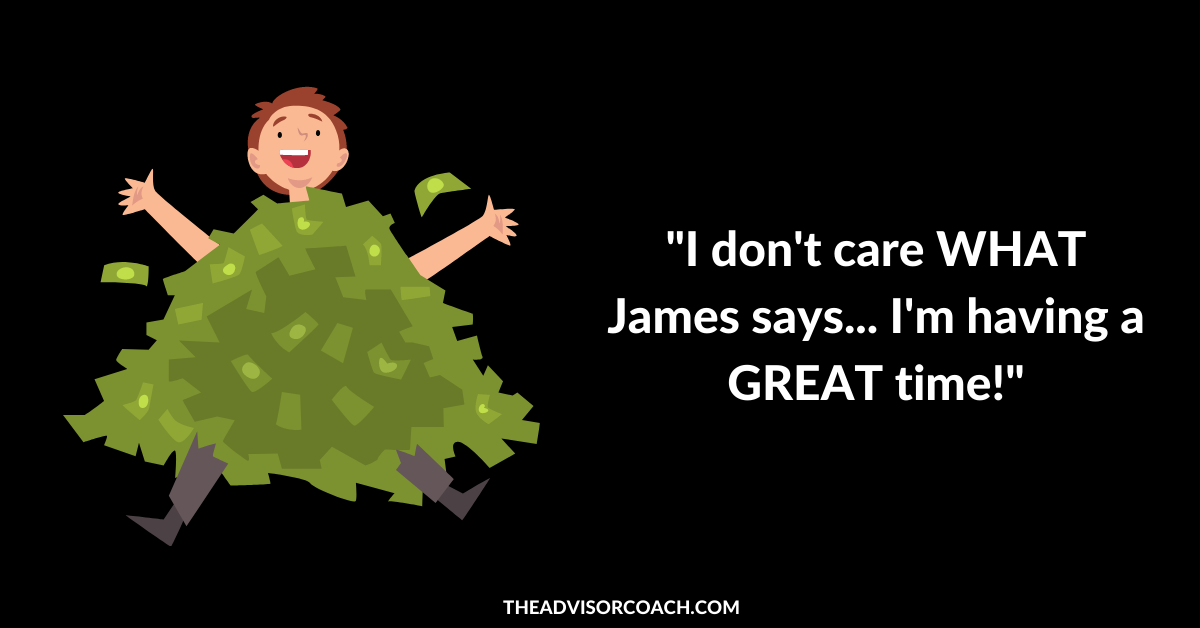8 Things Nobody Tells You About Being a Financial AdvisorI personally believe that there has never been a better time to be a financial advisor.
People need specialized advice in a world full of robo-advisors and investment blogs that say one thing and do another. Everywhere people turn, there’s another talking head either getting people jumping for joy or running for the hills. In a world full of confusion and noise, the one superhero you can depend on to help you navigate the waters is a financial advisor. One that cares, can be trusted, and holds him or herself to a high standard. The future is bright. Financial advisors that succeed find themselves in a career that provides them not only a healthy income but personal fulfillment too. However, there are some things that you don’t hear about, but should: 1. Most Financial Advisors FailThis is the biggest elephant in the room. A high turnover rate has always been a hallmark of the industry. Over the years, I’ve heard of turnover rates from 25% to 95%... and everything in between.
Putting it simply, being a financial advisor is HARD. If you’re looking for an easy career where you can just sit back and coast by, forget about it. It’s not for you. Another reason for the high turnover rate is the fact that many companies’ training programs haven’t adapted to the changing environment. While one of the best traits you can have as a financial advisor is the ability to learn new things, many firms are steering advisors in the wrong direction. Today’s consumers don’t respond as well to general marketers. Instead, they’re responding more than ever to people who can work with their specific needs. Yet most companies are teaching their advisors techniques and principles that might’ve worked forty years ago but fail to work today. Or if the techniques do work, other techniques that are 10X more effective get ignored in the process. ALSO READ: 7 Reasons Why Most Financial Advisors Fail 2. If You're In It For The Money Alone, You're Going To Have A Bad TimeA lot of financial advisors join the industry (at least partly) because they discover that they can make a lot of money. Don’t get me wrong, you definitely want to get paid well for your work and if you provide a lot of value, you should get paid extremely well… but you need to genuinely want to help people first.
Almost all firms say they “put their client’s interest first” but do you REALLY mean it? I mean deep in your heart… would you still do the right thing for your client even if it were detrimental to you? It’s something to think about because if you became a financial advisor for the commission targets, it might not be for you. You need to understand that you’re building a long-term business that can potentially last for decades. That’s much bigger than just the next paycheck. ALSO READ: Here’s Why Clients Fire Their Financial Advisors 3. You Should Like Working With PeopleIt’s almost funny, in a way. Some people who want to become financial advisors are aggressive salespeople, while others are shy and reserved. Both ends of the spectrum have it rough.
I’m talking to the person that loves finance but doesn’t do as well in a social setting. The person who can study his or her butt off and read countless reports but can’t pick up on the nuances of communication. There’s a big difference between cranking out an Excel spreadsheet and explaining financial topics to a client. The best financial advisors are the ones that can sit down with someone and talk about the person’s hopes, dreams, and unspoken fears. They’re the ones that can spot a problem with a prospect’s financial plan and gently point it out without offending him or her. They’re the ones that can take someone from prospect to client by communicating the value they provide over a period of days, weeks, or sometimes months. I remember reading somewhere that some people feel energized after dealing with others, while other people tend to feel drained and need alone time to energize. If you’re someone that gets energy from dealing with others, you’re going to have a huge advantage as a financial advisor. ALSO READ: 12 Best Financial Planning Questions to Ask Clients 4. Never Stop ProspectingTo avoid lulls in your business, you should never stop prospecting.
I’ve seen far too many advisors get caught in a boom-and-bust cycle… and I don’t mean in the stock market. I mean they get busy for a period and then go back to nothing. When they start hearing the crickets chirping, they go into prospecting mania. They frantically start doing whatever they can until they get a few results and then stop again. This doesn’t just have to happen on a monthly or quarterly basis, either. It can happen over many years. An advisor may prospect heavily for a few years and then coast, only to see his or her income steadily decline. Prospecting means that you have a system that can keep your pipeline full. If you never stop prospecting, you won’t have to rush to fill up your pipeline. However, there’s something else that nobody tells you about marketing and prospecting… ALSO READ: 15 Financial Advisor Prospecting Ideas 5. Avoid The Marketing TreadmillThis goes together with “never stop prospecting”. When I say that you should never stop prospecting, I don’t necessarily mean that you should hit the phones every day or hound your clients for referrals.
Notice the words that I used…. I said that prospect means that you have a system that can keep your pipeline full. Nowhere did I say that you need to break your back to do it. One of the biggest revelations I’ve ever had in my entire career working with financial advisors is that you need to do BOTH outbound and inbound marketing methods. Here’s why:
To succeed in a major way, you need to get good at both. You need to do the things that get your clients today and get you clients tomorrow. You need to be able to go out into the marketplace and extract revenue at will while at the same time having a system that can generate leads and appointments for you whether you’re sick or on vacation. If that means making calls during the day and writing content at night, you do it. If that means giving seminars during the day and growing your social media reach at night, you do it. Because if you don’t, you will always be trapped on the marketing treadmill. ALSO READ: 9 Awesome Content Marketing Tips for Financial Advisors 6. You DO Need To Be Good At "Selling"I’m always a little nervous about mentioning sales and financial advising in the same sentence because people tend to take it the wrong way. They think I mean that you need to learn countless closes and persuasive little lines that you can drop in a meeting. This isn’t what I mean.
At the end of the day, sales is about pairing a solution to a problem. To get good at sales, you need to get good at two things: uncovering a problem and pairing a solution to the problem. To uncover problems, you must ask the right questions. Then you have to know how to solve the problem. Do you know what makes this a LOT easier? Having a niche. When you have a niche, you only have to solve a select number of problems over and over. Eventually, you become the expert in solving those problems… it’s inevitable. ALSO READ: 7 Reasons Why Financial Advisors Need a Niche 7. A Mentor Can Shorten Your Learning Curve (But Be Careful)Mentors can provide a wealth of information and knowledge. They see where we need to improve, and they have experiences that you can learn from. However, finding a good mentor for a financial advisor can be a challenge. A lot of times this is because when you find someone who is successful as a financial advisor and you sit at their feet to learn, you’re only seeing the results, not the process. You’re not seeing the years of hard work that went into building a thriving book of business.
I take pride in helping financial advisors get more clients and I do it every day. I try my best to put a ton of content out there (emails, articles, podcasts, etc.) that help advisors accomplish their goals. I do it because I know that the information I put out helps thousands of advisors and can advance the entire industry forward. Oh yeah, and it doesn't matter if you've been in the business forty minutes or forty years. If there's an area that needs improvement, you need a mentor. If you're perfect at everything you're doing right now, I'd like to shake your hand. CAUTION: Sometimes choosing a mentor is one of the WORST things a new financial advisor can do. If you seek out a mentor, make sure you choose the right one. 8. You MUST Be Willing To Invest In YourselfThis is true for life in general, but it’s especially pertinent to financial advisors because there are so many different things for you to learn. You must invest both time and money. It takes time to learn from your mistakes. It takes money, both in cash outlay and opportunity cost, to grow your business and become better tomorrow.
I have always thought about it like this: “If you aren’t willing to invest in yourself, how can you possibly expect anyone else to invest in you?” Even if all you get from investing in yourself is a mental edge - the confidence that you get from taking a chance on yourself - it’s worth it. And unlike other things in life, the investments you make in your own self-confidence, your knowledge, and your belief can NEVER be taken away from you. If I lost everything today, I would be able to get it back with the knowledge I’ve gained from investing in myself. Many people are too afraid, too insecure or too lazy to invest in themselves. Here's a little story about how to "expose" people who talk a big game but can't back it up... If you listen to my podcast (called “Financial Advisor Marketing”) you may have heard me talk about the charities I like to support. I donate a LOT of books to kids. I believe that, with the right knowledge, children can expand their horizons and increase their odds of lifelong happiness. If I can help them, I’m glad to do it. Once upon a time, I ran an offer where people interested in coaching could donate $250 to a children’s charity to have a consultation with me. I wrote a letter that went something like this… “Hey, you’ve been on my coaching waitlist for several months and I’d like to give you a free thirty-minute consultation but I want to make sure you’re not a cheap flake who just wants free information and, no matter how good I am, you will never hire me. So, all I’m asking is that you pay $250 for the consultation, which is a small percentage of what I normally charge. Oh, and to make sure you know I’M not a flake, I don’t even want the money. I want you to donate the money directly to First Book (one of my favorite charities). Send me proof of your donation and we will set up a time to talk. The downside is, I’ll have wasted thirty minutes of my time and you’ll be out $250. The upside is that the children will be better off, and you and I will work together.” When all was said and done, this particular offer was a smashing success. Financial advisors got a bunch of help from me and kids got books that could change their lives forever. If that’s not a win-win, I don’t know what is. I tell you all that to tell you I was AMAZED at how this small sum of money separated the wheat from the chaff. Because my aim with this letter was to filter out all the low-level, tire-kicking financial advisors who I’d never want to work with anyway. In that sense, it worked wonders. Someone can talk about how important he is… How money is “no object”... How he runs a big company… And then you ask him to donate $250 to a legitimate charity and he’ll mumble, stumble, blush, and tell you he’ll have to “think about it”. LOL. The same concept applies with my Inner Circle newsletter, which “costs” a whopping… $3.26 PER DAY! 😱 And you would be astonished at how many “successful” advisors agonize over such a measly sum. Which means they’re giving “financial advice” for a living but can’t even invest in themselves. Oh well. I’ve learned to live with the fact that some people will never succeed because they can’t make the necessary investments in themselves to ensure their success. P.S. If you're a financial advisor who wants to get more clients from LinkedIn, make sure you check out How to Get Clients With LinkedIn: How Financial Advisors Can Set Appointments and Convert Prospects With LinkedIn |



